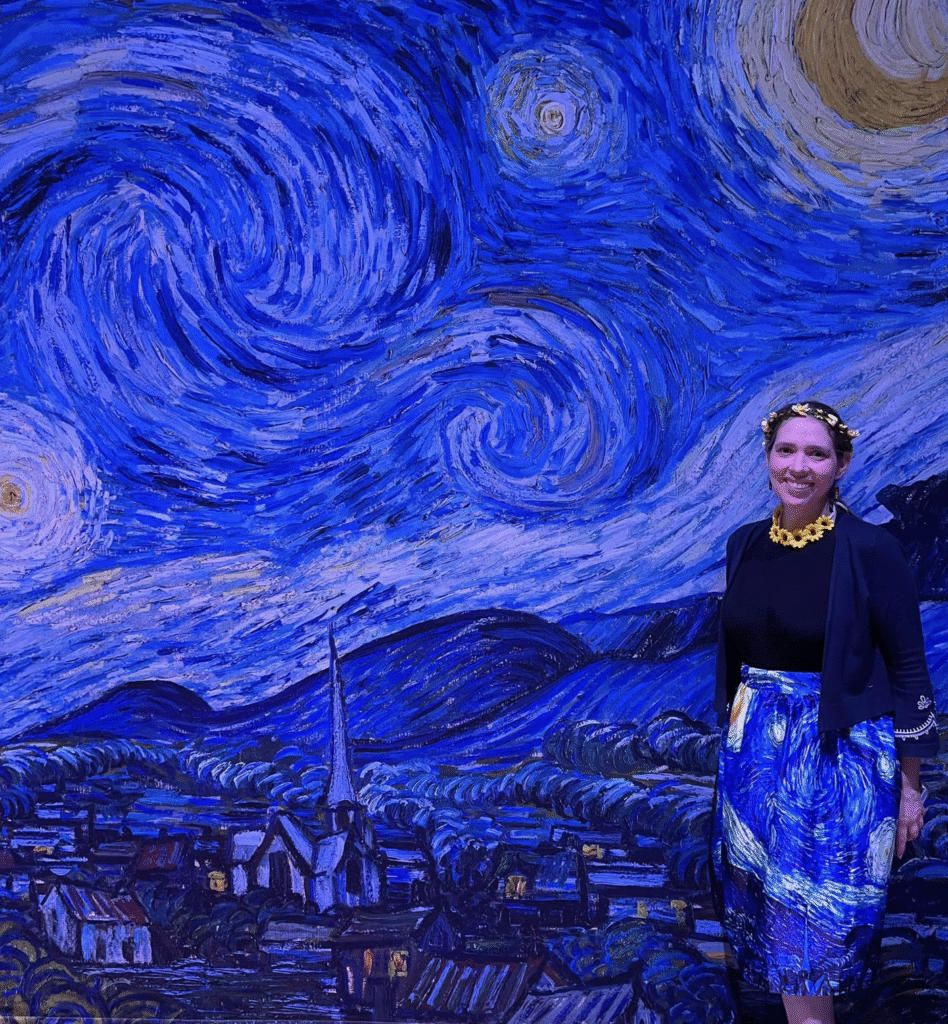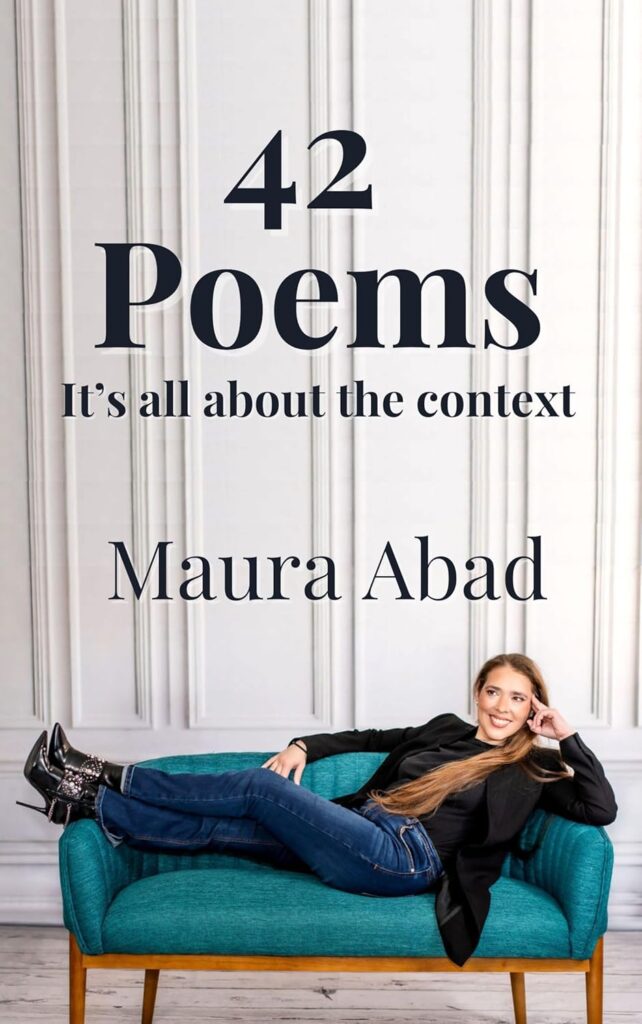42 Poems: Time made poetry, Life expressed in the sublime and the everyday
42 Poems, Maura Abad’s first work, marks her debut as a writer and her formal entry into the world of poetry, with a sweetness, rhythm, and depth that the author elegantly cultivates through her verses.
This work is a commitment to life and to the privilege of existing. The book collects emotions and feelings, experiences and desires, interpreted in a lyrical key, with phrases that touch hidden chords in those who immerse themselves in these poems.
Losing a loved one does not mean breaking the emotional bond, but rather a profound change in the way that love is expressed. For the author, her father’s departure from this world was the embryonic pain that gave rise to this work, whose poems reveal passages of the soul, brushstrokes of time suspended in an embrace, evocations of a past that always results in an eternal present when love is real.
But it is also a work that emphatically expresses the value of moments, the charm of everyday life, the strength to overcome adversity, that kind of quiet courage that the soul imprints on simple, everyday acts, which are ultimately loaded with meaning because they represent our footprints in the world, what we do with the life we have inherited, how much our parents’ breath lives on through our own breathing.
This book, 42, invites us to look at the world through a wide prism, to understand that our role is woven into the fabric of life, to appreciate every minute, to savor every breath of light, to discover our humanity in the little things, to rediscover ourselves as strong and complete beings through the love we are capable of feeling and expressing.
Each poem is an opportunity to experience a feeling, absorb an emotion, contemplate the rich prism of the human heart, a little to reflect on who we are, a little to project forward who we want to continue to be. Poetry has the intrinsic quality of giving us back a little of what we thought was lost and propelling our soul toward our most secret dreams. With 42, you will immerse yourself in this collective yet individual experience of feeling and being.
Overview of 42 Poems
Maura Abad’s 42 Poems is a profoundly personal and introspective collection, deeply influenced by the death of her father. The collection, subtitled “Is all about the context,” explores universal themes through accessible language, emphasizing poetry’s power to foster empathy and inspire positive change. Abad herself describes her creative process as a “gift” from her father, stating, “I am a vessel,” suggesting that the poems flow through her rather than being actively sought. The work delves into concepts of peace, the human condition, memory, self-discovery, and the crucial importance of living in the present moment.
Key Themes and Concepts
a) The Transformative Power of Poetry and the Nature of Peace
Abad views poetry not as a direct political tool but as a catalyst for inner transformation, capable of “planting the seeds for world peace in the most crucial terrain — the human heart.” Poetry achieves this by “creating emotional resonance, reshaping perspectives, humanizing the ‘other,’ and making the invisible visible.”
The poem “Peace” challenges simplistic definitions, arguing that peace is not merely the absence of conflict but “the transformation of contradictions” through awareness and love. It links peace with seemingly opposite pairs such as “Hate and love, lie and truth… Peace,” alongside values like “Acceptance, compassion, love” and “Integrity, ethics, culture.” This paradoxical understanding suggests that peace arises from processing and integrating life’s complexities.
b) Critique of the Human Condition and a Call to Action
“Planet Paz” serves as a “profound allegory that uses science fiction to critique the human condition and call for introspection.” The poem depicts aliens arriving on Earth, initially believing it to be a utopian “Planet Paz” where “humans respect the earth animals” and “there is no war.” This idealized view quickly “crumbles” as they realize “This is not The Planet Paz,” confronting the reality of humanity’s shortcomings like “war, environmental disregard, and human disconnection.”
This allegorical narrative acts as a “mirror to humanity,” prompting readers to question why Earth isn’t like Planet Paz and what needs to change. Despite the sharp critique, the poem offers hope: “The disappointment of the aliens doesn’t come from hostility, but sorrow.” This “leaves room for redemption,” framing the poem as “a call to action” for humanity to “dare to change” and build a better world.
c) Introspection, Self-Reflection, and Personal Growth
A central message throughout 42 Poems is the call for readers to look inward and embrace their true selves. Poems like “Recordatorio” encourage self-examination, asking, “Cuando miras al espejo ¿Qué es lo que ves?” and asserting, “Dentro de nosotros radica el poder.” “Open your eyes” directly addresses the reader to “Know your worth, know your value, You are special, very special.” It further empowers individuals by stating, “No one can push your buttons. Unless you allow it.” “Honor” reinforces self-acceptance by advising readers to “Honor your body, Honor your space… Honor your faults, Honor your growth. Honor who you are.” This recurring theme champions authenticity and personal empowerment. In “Drum,” the advice for a fast-paced world is to “Just listen the drum, the answers are inside,” suggesting inner quietness as a source of clarity. “The essence of the human being” notes the difficult truth that “the Essence of each of us, Is tainted with war and lies,” advocating for “authenticity” and genuine care as a remedy.
d) The Importance of the Present Moment
Abad frequently emphasizes the significance of living in the “here and now.” In “Solía,” the speaker’s journey from dwelling on the future or past leads to the realization that “solo el presente es lo que hay.” The poem concludes, “Vive, ríe en tu presente, es todo lo que hay.” Similarly, “Hay momentos en la vida” urges, “Vive en el presente, agradece, los recuerdos, Es lo que te llevarás.” “Be here now” serves as a direct command, reminding readers that “Life is happening as you are reading this… Don’t be passive …. Be here now.” “Peace of Mind” reinforces this, stating, “The past is gone, The present is here, The future is coming, is it? Just stay here and now.” This philosophical outlook encourages appreciation for the current moment as the only true reality.

e) Grief, Loss, and Legacy
The genesis of 42 Poems lies in the death of Maura Abad’s father. She explicitly states, “they all came after the death of my father.” She views her poetic ability as a “gift” transferred from him, “a way for me to express my pain, sadness, gratefulness and as many emotions sometimes I cannot describe.” Poems like “One of these days” touch on this profound loss, oscillating between memories of the past (“It seems like yesterday you read me books before I went to sleep”) and a hopeful longing for future reunion (“It seems like one of these days I will huge you again”). This personal origin imbues the broader messages of the collection with deep emotional resonance, particularly concerning themes of remembrance and the continuation of spirit.
f) Fragility of Life and Mortality
The collection directly confronts mortality, often using it as a catalyst for appreciating life and making an impact. “The reflection of life and death” describes visits to the cemetery to “remember what we are, We are nothing and we are everything, But all we have to live is the now.” This practice, along with the speaker’s daily gratitude in “Fragility of Life” (“I wake up and I thank: That I am here, That I am alive”), reinforces “the understanding of life’s extreme fragility.” The poem “When times comes” further urges acknowledgment of “The extreme fragility of this life,” prompting the reader to “make an impact until I have life.”
Structure and Poetic Devices
Abad’s poetry is characterized by:
- Simple Language and Direct Address:She often uses straightforward language and directly engages the reader, creating an accessible and intimate tone.
- Repetition and Parallelism:Evident in “Peace” with its “X and Y… Peace” structure, repetition creates a meditative rhythm and emphasizes key ideas.
- Allegory:“Planet Paz” is a primary example, using a fictional scenario to convey a deeper moral and political message.
- Metaphor and Imagery:Abstract concepts are given tangible forms, as seen in “Sadness is a River” or poetry being “Like a River.”
- Paradox:The deliberate inclusion of contradictory pairs, especially in “Peace,” highlights the complexity and transformative nature of concepts.

Conclusion
Maura Abad’s 42 Poems offers a compelling journey through personal grief to universal insights. Through its exploration of peace, self-discovery, the present moment, and the human condition, the collection underscores poetry’s unique ability to “awaken empathy, inspire change, and remind us of our shared humanity. That’s a foundation no peace can exist without.”





